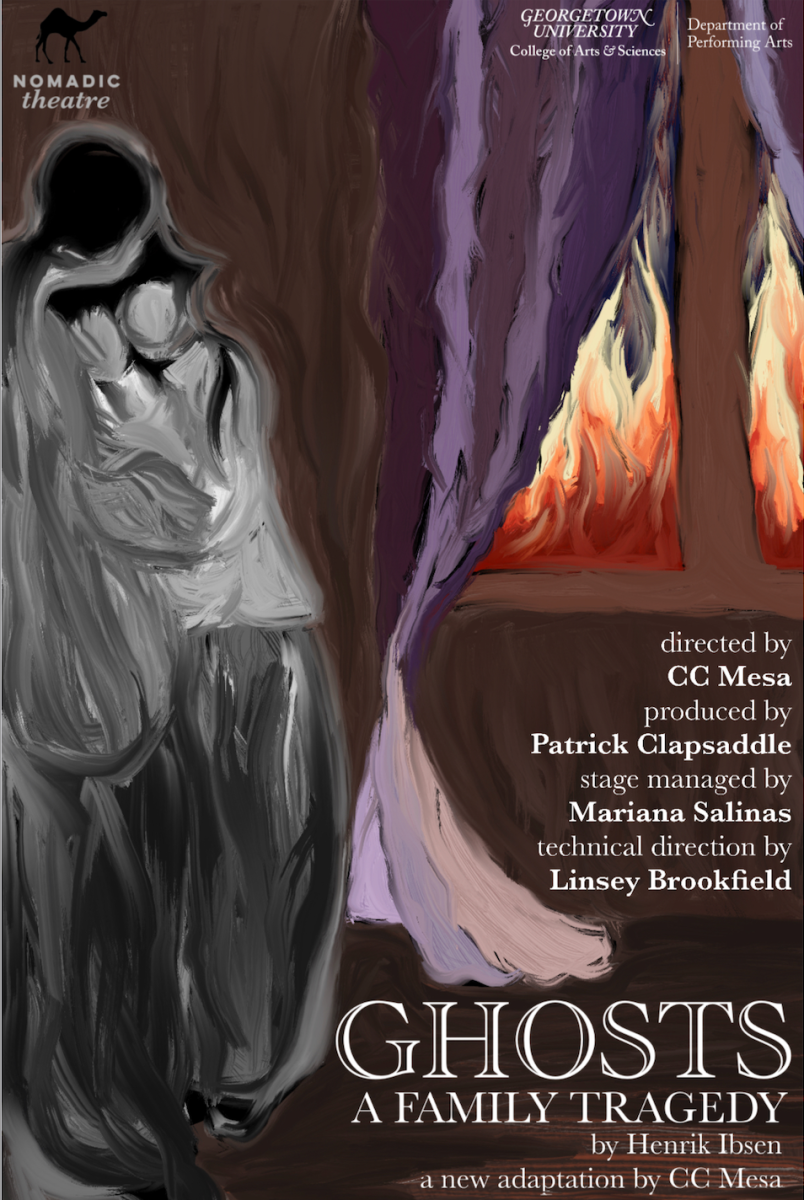
@nomadictheatre

Is it better to live a life defined by painful truths or comfortable illusions? Nomadic Theatre’s “Ghosts: A Family Tragedy” explores this question through its critical examination of family, duty and devotion. From Friday, April 4 through Saturday, April 5, the Village C Theater will be ablaze with the boiling tension and searing emotion of CC Mesa’s (SFS ’26) adaptation of Henrik Ibsen’s masterful social commentary, “Ghosts.”
After the esteemed Captain Alving dies, his widow, Helene Alving (Claire Cable, CAS ’27), and Pastor Manders (Will Kennedy, CAS ’25) build an orphanage in his honor. Upon the return of Helene’s only son, Osvald Alving (Brendan Teehan, CAS ’25), she is forced to grapple with unforgiving echoes of the haunted past from which she has tried so hard to protect him.
A scathing commentary on the immorality that plagues many a reputable public figure and society’s largely backward conventional view of family, the play largely hinges on the tense discussions between the Alvings and Pastor Manders. The stellar and emotionally loaded performances of the leading cast members and their impeccable chemistry are what make this production so successful and memorable.
Cable’s masterful expression of complex emotional subtlety renders Mrs. Alving a realistically multidimensional character, but where Cable truly shines is in her moments of emotional outburst. Mrs. Alving’s steadfastness and frustration with Pastor Manders’ self-proclaimed infallibility reach a breaking point when she sheds her polite demeanor and exclaims, “I want my son to be happy!”
Kennedy delivers Pastor Manders’ arrogance and deceitful kindness well, exuding judgment and occasional acrimony toward Mrs. Alving and her son’s perspectives, which frequently oppose his own. Teehan’s portrayal of Osvald is very strong as well, though I find that his performance in the second act eclipses that of the first act. As his character takes on additional dimensionality, he rises to the occasion, hammering in the play’s core tragedy in the fast-paced, climactic ending.
The Alving duo’s relationships with the Engstrands, another family whose lives have been poisoned by deceit, further complicates the tension between them and Pastor Manders. Jakob Engstrand, portrayed by Tai Remus Elliot (University of Edinburgh), tries repeatedly to heal his relationship with his daughter, Regine Engstrand (Anna Kummelstedt, SFS ’25), whose loyalties lie with her employers, the Alvings.
Kummelstedt’s expressive line delivery and accompanying gestures excellently convey Regine’s wittiness. Her snarky attitude balances well with Elliot’s endearing portrayal of genuine fatherly concern for her, which toes the line between sincerity and creepiness at all the right times. As Jakob redeems himself to the other characters and, in turn, the audience, one cannot help but pity him, a telltale sign of a strong performance.
Beyond incredible acting, the set’s ambience contributes to the production’s excellence. Taking place entirely in the Alvings’ home, the impeccable furnishings establish the family’s wealth. The impressive backdrop of a Norwegian fjord anchors the play in a world larger than the four walls of the conservatory. The interplay of lights and sound effects illustrates the changing weather conditions, further enhancing the audience’s immersion in this world.
The costuming and makeup only supplement the atmosphere of the show and contribute to the play’s aesthetic unity. From Jakob’s graying hair to the women’s briefly visible shawls, not a single detail is forgotten.
The props and set dressers’ attention to detail does not go unseen, either — when Pastor Manders enters the house seeking shelter from the rain, his briefcase is wet. This level of detail distinguishes a solid play from a splendid one, and “Ghosts: A Family Tragedy” is undoubtedly the latter.
Despite being set in an unnamed, remote Norwegian town in the 20th century, the play’s themes resonate even today. There are plenty of lessons one can learn from the show, but perhaps most importantly, “Ghosts” urges us to scrutinize the lifeless ideals we uphold, both individually and collectively. Its discussions of disability, familial devotion and religious ideals are striking, yet fascinating and necessary.
While Ibsen’s plays can be difficult for present-day audiences to comprehend, Mesa’s skillful adaptation successfully transmits the play’s exploration of complex issues that plague society. Under impeccable direction by Mesa, the play’s technical and artistic elements and emotional performances create a powerful production. “Ghosts: A Family Tragedy” promises an intense journey that is harrowing at times and heartwarming at others, yet wholly incredible.